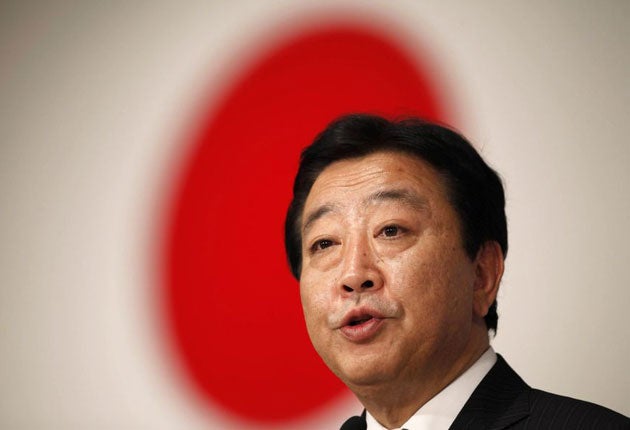Japan's new leader Yoshihiko Noda to tackle post-tsunami crisis

A hawkish fiscal and foreign policy conservative who supports nuclear power will be sworn in today as Japan's sixth prime minister in five years.
Finance Minister Yoshihiko Noda, 54, faces the huge task of clearing up after the March quake and tsunami, ending the nuclear crisis in Fukushima and tackling the country’s enormous public debt.
He was elected head of the ruling Democrats (DPJ) yesterday after beating Trade Minister Banri Kaieda, in a poll that exposed the party’s growing divisions. Mr Noda will replace Naoto Kan, who resigned last week following withering criticism for his government’s response to the March 11 disaster.
The new leader yesterday he urged the party and the disaster-hit nation to “sweat together” with him as he works to bail Japan out of its worst crisis in decades.
Mr Noda became the latest Japanese politician to rile Asia this month when he denied that Japan’s wartime leaders were criminals. Quizzed by reporters on August 15, the anniversary of Japan’s surrender in World War Two, Mr Noda refused to rule out a prime ministerial visit to Yasukuni Shrine, which honours the nation’s war dead, including 14 executed Class-A war criminals.
The statements were condemned in China and South Korea, where one newspaper called them reminiscent of “ultra-rightist and militaristic elements.
Mr Noda has warned about China’s growing military clout and strongly defended Japan’s half-century military alliance with the US, which he calls “essential for Japan’s security and prosperity.” His position marks a clear break with his DPJ predecessor Yukio Hatoyama, who favoured closer links with China and a more independent defence policy.
Yesterday’s election effectively terminates the DPJ’s left-leaning programme, which began two years ago after Mr Hatoyama ended over half a century of virtual one-party rule by the conservative Liberal Democratic Party (LDP). Mr Noda opposes large-scale welfare spending and wants to raise the consumption tax to pay for reconstruction. His foreign policy pronouncements put him closer to the old LDP.
Japanese voters are hoping for stable leadership after a string of short-lived prime ministers since 2006. Mr Noda’s predecessor Naoto Kan was the first leader in five years to last more than 12 months. The bickering and infighting that characterised his last months in office recalled for many the worst moments of the discredited LDP.
The prime minister’s first task will be uniting the divided ruling party, long dominated by a faction loyal to kingpin Ichiro Ozawa, one of its key architects. Mr Ozawa backed Mr Noda’s rival Banri Kaieda, who lost 177 to 215 votes, raising the long-threatened specter of the DPJ’s disintegration. He must also tackle the record-high strength of the yen, which is forcing many manufacturers to consider moving abroad.
Mr Noda has not backed Naoto Kan’s call for a rethink of nuclear power and says the nation’s reactors must be restarted. Yesterday Greenpeace called on the new leader to delay the opening of schools in Fukushima City this week after testing found high radiation levels from the crippled Fukushima nuclear plant in a pre-school, secondary school and child care centre.
Subscribe to Independent Premium to bookmark this article
Want to bookmark your favourite articles and stories to read or reference later? Start your Independent Premium subscription today.

Join our commenting forum
Join thought-provoking conversations, follow other Independent readers and see their replies